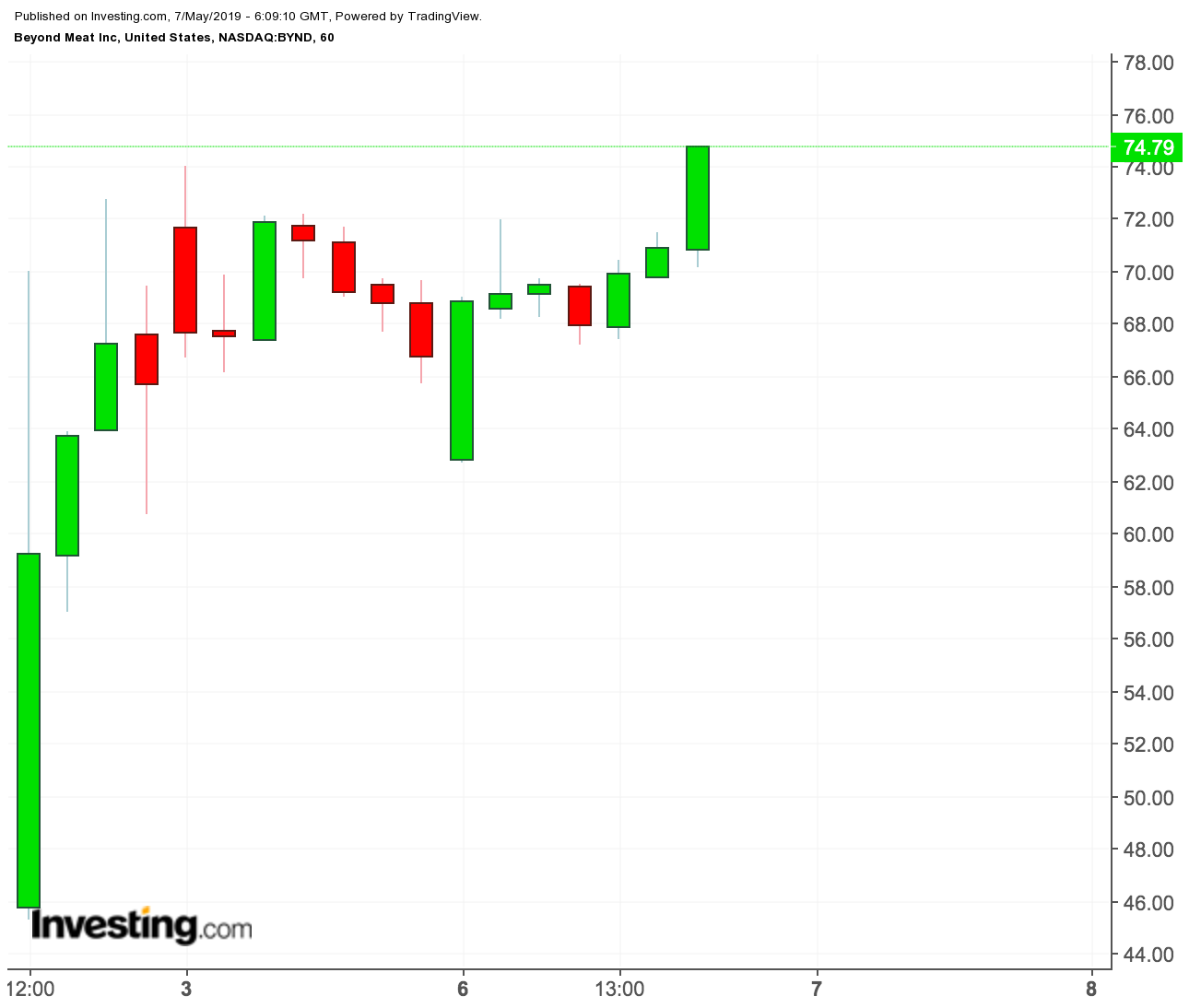Beyond Meat Inc (NASDAQ:BYND) investors who bought shares in last week's initial public offering (IPO) have every reason to feel pleased with themselves. The stock has jumped almost 200% since the maker of plant-based burgers raised $240 million in the highly successful IPO on May 2.
The demand for its shares has been so strong that its debut on the NASDAQ last Friday was the best among IPOs that raised $200 million or more since before the 2008 financial crisis, according to Bloomberg data.
Beyond Meat’s initial public offering was priced at $25 a share, the top end of the $23-$25 range, valuing the company at just under $1.5 billion. At its $68.84 opening price on Monday, the company's market cap had soared to $3.97 billion after just three days of trading. The shares closed up 12% yesterday, at $74.79.

Clever Marketing Push
What’s unique about the El Segundo, California maker of plant-based burgers and sausages that attracted investors like Bill Gates and Leonardo DiCaprio in its early days? Beyond Meat is targeting consumers who are seeking a meat substitute that looks and tastes good. Beyond Meat’s biggest attraction is that its products come surprisingly close to real meat in taste, smell, texture and appearance.
Luckily for Beyond Meat, the $878 million-a-year-and-growing market for meat substitutes was left open by big food players for startups like Beyond Meat and privately-held Impossible Foods Inc. to fill the gap. To capture this broad market opportunity, Beyond Meat developed three plant-based products that align with the largest meat categories globally: beef, pork and poultry.
But what made Beyond Meat products tick in 11,000 U.S. grocery stores was the company’s clever marketing strategy that sought shelf space where mainstream customers looked for their meat, instead of just going after vegans who make up less than 5% of the U.S. population.
The company’s growing revenue suggests that meat consumers in the U.S. are likely the company’s customers. From just $8.8 million in 2015, Beyond Meat’s net revenue rose to $56.4 million in the first nine months of the fiscal year 2018, according to the company’s prospectus. That number was 167% higher when compared to the same period a year ago.
The story looks great and very reassuring for those who got hold of Beyond Beat shares during the IPO stage, or on the first day of its public debut. But going forward, that upward growth trajectory isn’t going to be entirely straightforward, in our view.
Risk of Competition
First, Beyond Meat’s market doesn’t have very high barriers to entry. Learning from its success, more large and small food players will inevitably enter the market and fill the shelf space with more choices.
Tyson Foods Inc. (NYSE:TSN), the largest U.S. meat producer, is probably the first big threat to Beyond Meat. The company sold its stake in Beyond Meat just before its IPO, signaling its intention to play hard in the vegetarian protein market.
The company plans to accelerate and develop its own alternative-protein business line, and every kind of protein is on the table from legumes and peas to mushrooms and insects, Justin Whitmore, Tyson’s chief sustainability officer said in March.
“We’re going to be making significant investments in the space,” Whitmore told Bloomberg. “The companies and ecosystem that are in place to provide protein to the world can do the same thing for alternative protein — the mechanics of the supply chain all the way from the farm to your plate don’t necessarily change.”
In an environment that's shaping up to be pretty cutthroat, this means that Beyond Meat will have to spend a lot on R&D and marketing. That spending will make it harder for the company to achieve profitability sooner. In the first nine months of 2018, the company lost more than $22 million on the sales of $56 million.
Bottom Line
Beyond Meat has grabbed the attention of a market in which a lot of money is chasing very few good ideas. But in that process, its stock has become too expensive and risky. We don’t think Beyond Meat's rally justifies its 44 times 2018 sale multiple over the long run, given the competitive threats from large players. The stock has run its course and is vulnerable to a correction.
